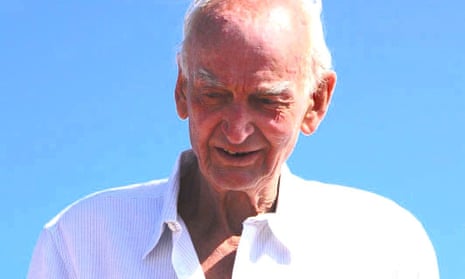Charles Sprawson, author of the cult swimming classic Haunts of the Black Masseur, has died at the age of 78.
The news was announced by Sprawson’s friend and fellow author Alex Preston, who called him “a majestic writer, a brilliant mind, a great friend”, and Haunts of the Black Masseur “the best book about swimming, perhaps the best book about any sport, ever written”.
“Like all great books, it’s about so much more than its purported title and is full of the most brilliant passages of memoir, nature writing and literary criticism. It provided a model not only for so many of the swimming memoirs that have become such a staple of the literary landscape, but also for a range of authors from William Fiennes to Philip Hoare to Ann Wroe – who weave together life writing, literature and the natural world in the elegant footsteps of Sprawson … I hope that wherever Charles is now, he is doing what made him happiest – swimming,” said Preston, who raised thousands of pounds by swimming the Hellespont in 2018 to help fund Sprawson’s long-term medical care. The author had been suffering from vascular dementia.
Preston said Sprawson had been working on a second book, about Slovenian endurance swimmer Martin Strel, but that it remained in draft form.
Born in Pakistan, Sprawson published only one book, an exploration of the history of swimming that JG Ballard called “an exhilarating plunge” and Iris Murdoch said was “as zestful as a plunge in champagne”. Tracing the great swimming heroes, from Byron crossing the Hellespont to Hart Crane diving to his death in the Bay of Mexico, it also delved into the character of swimmers – people who Sprawson described as “rather remote and divorced from everyday life, devoted to a mode of exercise where most of the body remains submerged and self-absorbed”.
“It seemed to me that it appealed to the introverted and eccentric, individualists involved in a mental world of their own,” he wrote.
The book also laid out Sprawson’s own, although somewhat less romantic swim across the Hellespont, the four-mile strait that connects Europe to Asia. “Within seconds of entering the water I was enveloped in waves and dragged sideways, but managed to cling to some rocks, from where I groped my way back to the shore, to the vast amusement of the passengers lining the decks of the departing ferry,” he wrote.
Published in 1992 to great acclaim, Haunts of the Black Masseur was subsequently largely forgotten, although it is regarded as the precursor to the now popular narrative non-fiction about the natural world. Sprawson later worked as an art dealer, but Haunts received a new lease of life when it was reissued by Vintage in 2013 with a new introduction from the writer Amy Liptrot.
Last year, a BBC Radio 4 programme, Searching for Swimming Pools, followed the author as he navigated a retirement home and his advancing vascular dementia. The BBC described the programme as a “portrait of lifelong obsession, the debilitating effects of dementia and the transformative power of swimming”, adding that “even as [Sprawson] grows increasingly frail, he can still be found wandering the corridors looking for swimming pools, opening doors in the hope of finding shimmering water to plunge into”.
Literary agent David Godwin, who first commissioned Sprawson to write Haunts of the Black Masseur for publisher Jonathan Cape, remembered him as “a very special man, sophisticated, clever and eccentric – and this is a tragic end.”
“I thought Haunts would be a great book but I’d only been at Jonathan Cape for about a month and everyone thought it was the most insane commission they’d ever heard of, but it turned out to be an amazing book,” he said. “I wish he’d written more than one.”
